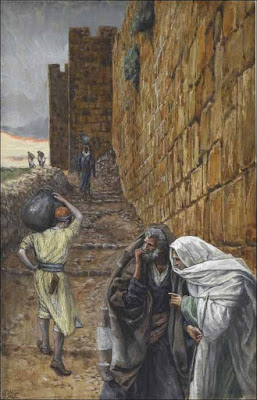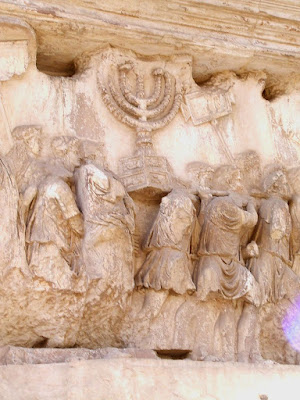Section 112
GREEKS SEEK JESUS. HE FORETELLS THAT HE
SHALL DRAW ALL MEN UNTO HIM.
(In the Temple. Tuesday, April 4, A. D. 30.)
JOHN 12:20-50
Summary: Jesus speaks to some Greeks and reflects upon his current role on earth and His Father's larger will.
"The mention of Greeks is significant. They were the wanderers of the ancient world and the seekers of truth. These Greeks were probably God-fearers who attended Jewish synagogues and feasts. Their coming was symbolic of the coming of Gentiles to worship God through Christ (cf. Joh_10:16)."-Barnes?
John from the beginning of his Gospel (Joh_1:11) had sounded the theme of national unbelief. John now explained that in spite of all Jesus’ miraculous signs (sēmeia), they still would not believe in Him. Their unbelief was irrational, as sin always is. -BKC
"He came to his own, and his own people did not receive him." John 1:11
"The purpose of God’s revelation in Jesus is positive: He came to save, not to judge (Joh_12:47; cf. Joh_3:17 and comments on Joh_9:39). But rejection of God’s Revelation inevitably brings a hardening in sin and ultimately God’s judgment.-BKC
In speaking of Jewish national unbelief John balanced his theological explanation with Jesus’ serious exhortation to the nation to repent. In the words of Moses, these “are not just idle words for you - they are your life” (Deu_32:47). -BKC
He says
the word he spake will judge them in the last day. v.47----logos, the word is powerful and John conveys this repeatedly.
"Isaiah said these things because he saw his glory and spoke of him." John 12:41
"In Isaiah 6 the prophet was described as seeing the glory of God. John now added the explanation that it was Christ's glory which Isaiah saw, and it was of Christ that he spoke. Thus, this verse is another important link in the chain of evidence that proves Jesus Christ to be God." -Believer's Bible
And he refers to these as commands that come from the Father, "He hath given me a commandment, what I should say, what I should speak." v. 49
And he "
knows this commandment is life eternal." John 12:50
How is the word commandment being used in this passage?
entole, "Injunction" "authoritative prescripton" (Strong's)
He remarks that the Father "hath said" these things "unto me." v 50 Also interesting....that this is not an internal understanding but represented as a spoken passing on, oral conversation between them.
*****************
I find it interesting that Jesus skirted his opposition until toward the end. Then he set himself up in the temple in Jerusalem, giving all wide access to him for good or evil. He played by His rules alone, determined by the will of His Father and their eternal perspective. As we draw near to the end of his earthly life, his words feel weightier and weightier.
"Verily, verily, [with these emphatic
words Jesus prepares for a hard saying],
I say unto you,
Except a grain of wheat fall into the earth and die,
it abideth by itself alone; but if it die, it beareth much
fruit. [As the germ of life in the grain of wheat can only
pass into other grains by departing from the original grain
and leaving it dead, so the life which was in Christ Jesus
could only pass into his disciples by his death.] -Fourfold and John 12:24
Verily, verily....
But if it die.....
I don't like the inherent cost and seeming finality of this statement and necessary process.
The seed not only perpetuates the life of the plant, but multiples it. It's a birth process that brings life over and over again:
"If a grain of wheat saves
itself, it remains but one grain until it rots; but if it yields up
its life-germ as a sacrifice to the law of growth, it multiplies
itself thirty, sixty, or a hundred fold and continues its
multiplication through an innumerable posterity." -Fourfold
"All the beauty and richness of the harvest results from the fact that the grain had died. If it had not died it would never have germinated or produced the glory of the yellow harvest. So with him. By this he still keeps before them the truth that he was to be glorified,
but he delicately and beautifully introduces the idea still that he must die." -Barnes
"And die - The whole body or substance of the grain, except the germ, dies in the earth or is decomposed, and this decomposed substance constitutes the first nourishment of the tender germ a nutriment wonderfully adapted to it, and fitted to nourish it until it becomes vigorous enough to derive its support entirely from the ground. In this God has shown his wisdom and goodness. No one thing could be more evidently fitted for another than this provision made in the grain itself for the future wants of the tender germ." -Barnes
"If
any man serve me, let him follow me; and where I am,
there shall also my servant be: if any man serve me, him
will the Father honor." -John 12:26
**********************************************************
"The joy of being with Christ is the chief
expectation of the Christian--II. Cor. 5:8; Phil. 1:23; Rev.
21:3; 22:20."-Fourfold
"We are confident, I say, and willing rather to be absent from the body, and to be present with the Lord."-2 Corinthians 5:8
"For I am in a strait betwixt two, having a desire to depart, and to be with Christ; which is far better." Philippians 1:23
"And I heard a great voice out of heaven saying, Behold, the tabernacle of God is with men, and he will dwell with them, and they shall be his people, and God himself shall be with them, and be their God."Revelation 21:3
"He which testifieth these things saith, Surely I come quickly. Amen. Even so, come, Lord Jesus."
Revelation 22:20
***************************************************************
"
Father, save me from this hour.
But for this cause [for this purpose of imparting life
through a sacrificial death]
came I unto this hour. [Thus
Jesus proposes a prayer for deliverance, but repudiates it as
contrary to the very purpose of his life.]" -John 12:27 plus Forefold comments
"Father,
glorify thy name." -John 12:28
"Having refused to ask for deliverance,
Jesus prays that he may glorify the Father by suffering
according to his original statement contained in verses 23
and 24." -Fourfold Gospel
When my father died in a hospital room in Charlotte in 1999, I was holding his hand and singing the only Christian song that came to my mind at the time...a bit of it is,
"Father, we love you
we praise you and adore you,
glorify your name in all the earth.
glorify your name,
glorify your name,
glorify your name in all the earth."
It seemed like an odd choice then--the thought that my father's earthly suffering and death would somehow glorify God. Also, it didn't feel like a particularly comforting song to sing to him. Over the years though, I've been thankful for the choice. It's solid. It's true. God used Jesus' death before my father's and
The mysterious dividing power of Christ:
"Jesus so came, so loved, and so taught
that those who hunger for godliness are drawn to him and
enlightened by him, while those who despise the grace and
love of God are repelled and blinded."-Fourfold
"Walk while ye have the
light, that darkness overtake you not: and he that
walketh in the darkness knoweth not whither he goeth. While ye have the light, believe on the light, that ye
may become sons of light." -John 12:35-36
"These things spake Jesus, and he departed and hid himself from them." John 12:36
"Nevertheless even of the rulers many believed
on him; but because of the Pharisees they did not
confess it, lest they should be put out of the synagogue: for they loved the glory that is of men more than the
glory that is of God." John 12:42-43
These members of the Sanhedrin
believed with the head rather than with the heart (Rom.
10:10); their hearts already being occupied with the love of
praise or man-glory. Their disbelief accorded with the
words of Jesus (John 5:44). As to expulsion from the
synagogue, see John 9:22. -Fourfold
"For with the heart man believeth unto righteousness; and with the mouth confession is made unto salvation." Romans." 10:10
"How can ye believe, which receive honour one of another, and seek not the honour that cometh from God only?" John 5:44
"This was his last public appeal to the
people. He now retired, probably to Bethany, and they saw
him no more until he was a prisoner in the hands of his
enemies." -Fourfold



